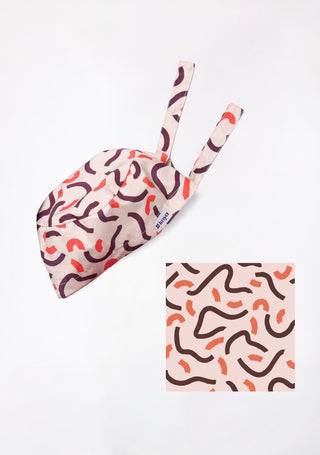Being a male nurse means mastering both functionality and style. It’s not about runway fashion it’s about looking and feeling your best while delivering the best patient care. Choosing well-fitted scrubs, investing in quality shoes, grooming meticulously, and adding subtle personality to your outfits can create a huge positive impact, both personally and professionally.
Good style for male nurses isn’t about being flashy; it’s about being smart, confident, and polished — because even under the toughest conditions, a sharp appearance helps you bring your best self to every shift.
Prioritize Fit Over Fashion Trends
No matter how trendy your scrubs or work clothes are, if they don’t fit well, you won't look polished. Baggy, oversized scrubs can look sloppy and unprofessional, while clothes that are too tight can restrict movement and look inappropriate.
Tip:
- Choose scrubs or uniforms that complement your body shape.
- Look for tapered pants or semi-fitted tops that allow mobility without looking shapeless.
- Many brands now offer "athletic fit" or "slim fit" scrubs that balance comfort and style.
Bonus: A well-fitted outfit can even make inexpensive uniforms look premium.
Select High-Quality, Durable Fabrics
Healthcare is a physically demanding field — your clothing needs to survive long shifts, multiple washes, and the occasional spill. Cheap, thin fabrics can wear out quickly and look unprofessional.
Tip:
- Choose scrubs made from durable, breathable, and stretchy materials like polyester-cotton blends with a bit of spandex.
- Look for wrinkle-resistant and moisture-wicking fabrics. You’ll stay fresher and neater throughout your shift.
- Darker colors tend to hide stains better than lighter shades.
Brands to Check:
- FIGS
- Jaanuu
- Cherokee
- Grey’s Anatomy by Barco
These brands are known for stylish and durable medical wear designed with active professionals in mind.
For our male healthcare professionals, we offer a wide range of comfortable and stylish scrubs for men, designed to enhance both comfort and professional image
Choose the Right Colors
In many hospitals, you might be restricted to specific uniform colors based on your department. But where you have a choice, color can be a tool to express professionalism and approachability.
Color Tips:
-
Navy Blue, Charcoal, and Hunter Green: Timeless, professional, and flattering on most skin tones.
-
Royal Blue: Energetic and friendly, but still professional.
-
Black: Sleek and modern, but be cautious — it can sometimes seem harsh in pediatric or geriatric settings.
-
Light Grey or Soft Green: Softer and more calming, ideal for patient-centered roles.
Avoid excessively bright or neon colors unless permitted — you don’t want to distract patients or colleagues.
Grooming Is Non-Negotiable
Style isn’t just about clothes. Grooming is equally, if not more, important for male nurses.
Checklist:
- Keep facial hair neat and trimmed.
- Maintain clean, short nails.
- Practice good hygiene: fresh breath, deodorant, and clean hair are musts.
- Use a subtle, fresh-scented cologne if allowed — but avoid strong fragrances that might irritate patients.
Patients associate grooming with cleanliness. In healthcare, where trust is essential, it’s worth paying attention to the small details.
Invest in High-Quality Footwear
Nursing shifts are long, often extending beyond 12 hours. Comfortable, supportive footwear is critical — but that doesn't mean you have to sacrifice style.
Shoe Tips:
- Opt for sleek, supportive sneakers or professional nursing shoes.
- Look for shoes with arch support, slip-resistance, and breathable materials.
- Black, grey, or navy shoes often match uniforms better and hide wear-and-tear.
- Keep them clean! Scuffed or dirty shoes can ruin an otherwise sharp look.
Top Brands for Nurses:
- Nike Air Zoom Pulse (designed specifically for healthcare workers)
- Hoka One One
- Brooks
- Dansko Professional Clogs
Always keep a backup pair of socks and foot powder in your locker for emergency freshening up.
Accessorize Smartly
Accessories should be functional and minimal. You’re working in a clinical environment — less is more.
Smart Accessories:
- A classic, waterproof wristwatch with a second hand (useful for taking vitals).
- A badge reel that matches or complements your uniform.
- A slim, practical belt if needed.
- A sturdy, stylish backpack or messenger bag for carrying your essentials to work.
Avoid excessive jewelry, loud bracelets, or anything that could be unhygienic or hazardous.
Discover the best lab coat designed for comfort and protection. Shop from here.
Layer Wisely
Hospitals can have fluctuating temperatures — freezing in one ward, stifling in another. Having layering options is both practical and stylish.
Layering Tips:
- A lightweight, zip-up scrub jacket in a matching or complementary color.
- Neutral cardigans (if allowed) for warmth and a professional look.
- Long-sleeved undershirts (preferably moisture-wicking) under your scrub tops when it’s cold.
Stick to clean, solid colors for layers. Loud prints can look distracting and are often not workplace-appropriate.
Express Personality Subtly
While professionalism is the foundation, a subtle touch of personality can make you more approachable to patients and coworkers.
How to Add Personality:
- Choose a scrub top with a slight accent color on the pocket or trim.
- Fun socks (if hidden by your shoes and pants) can be a morale booster.
- A unique badge reel or customized stethoscope can add a personal flair without breaching professionalism.
However, always respect your hospital’s dress code and cultural sensitivities.
Stay Updated and Adapt
Fashion, even for scrubs, evolves. Stay updated about new options available in the market. Newer fabrics, cuts, and designs appear frequently — especially with the rise of stylish medical wear brands.
If your workplace allows a little freedom in uniform styles, rotate pieces occasionally to keep your wardrobe fresh. Feeling good in what you wear translates into better performance and confidence at work.
Confidence Is the Ultimate Style
Finally, the most important tip: Wear your confidence. When you know you look good, you feel good. Patients, families, and coworkers can sense that energy. Walk tall, smile, and carry yourself with professionalism and pride.
Remember: your patients are often at their most vulnerable. A neat, approachable, confident male nurse can be a pillar of strength and comfort.















